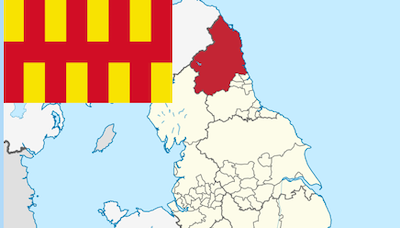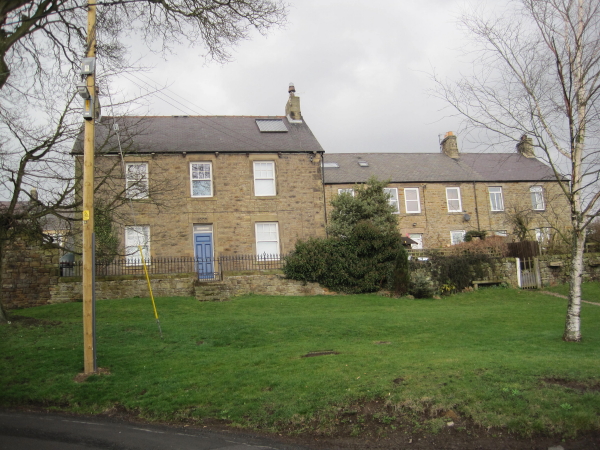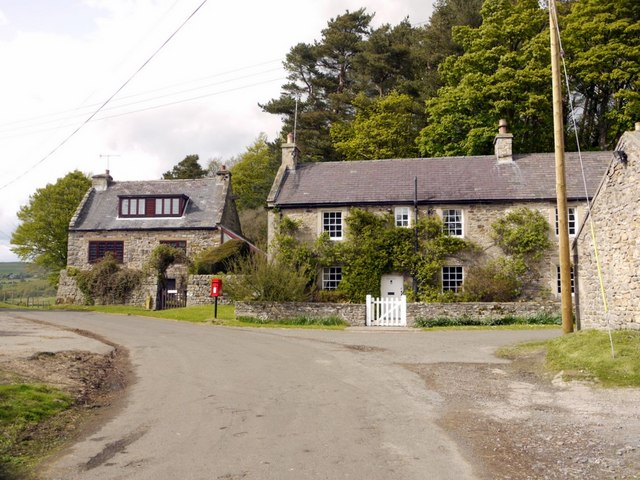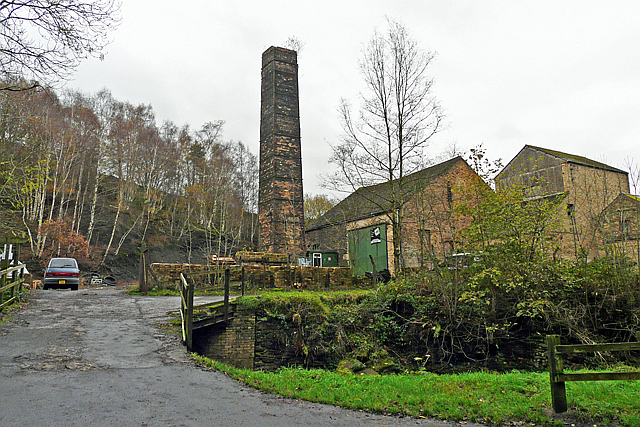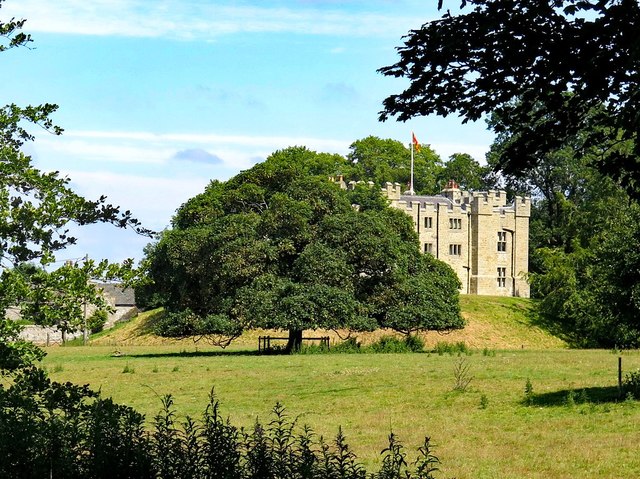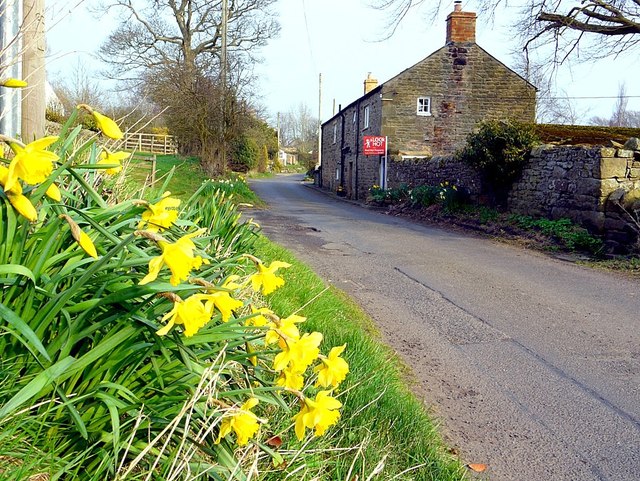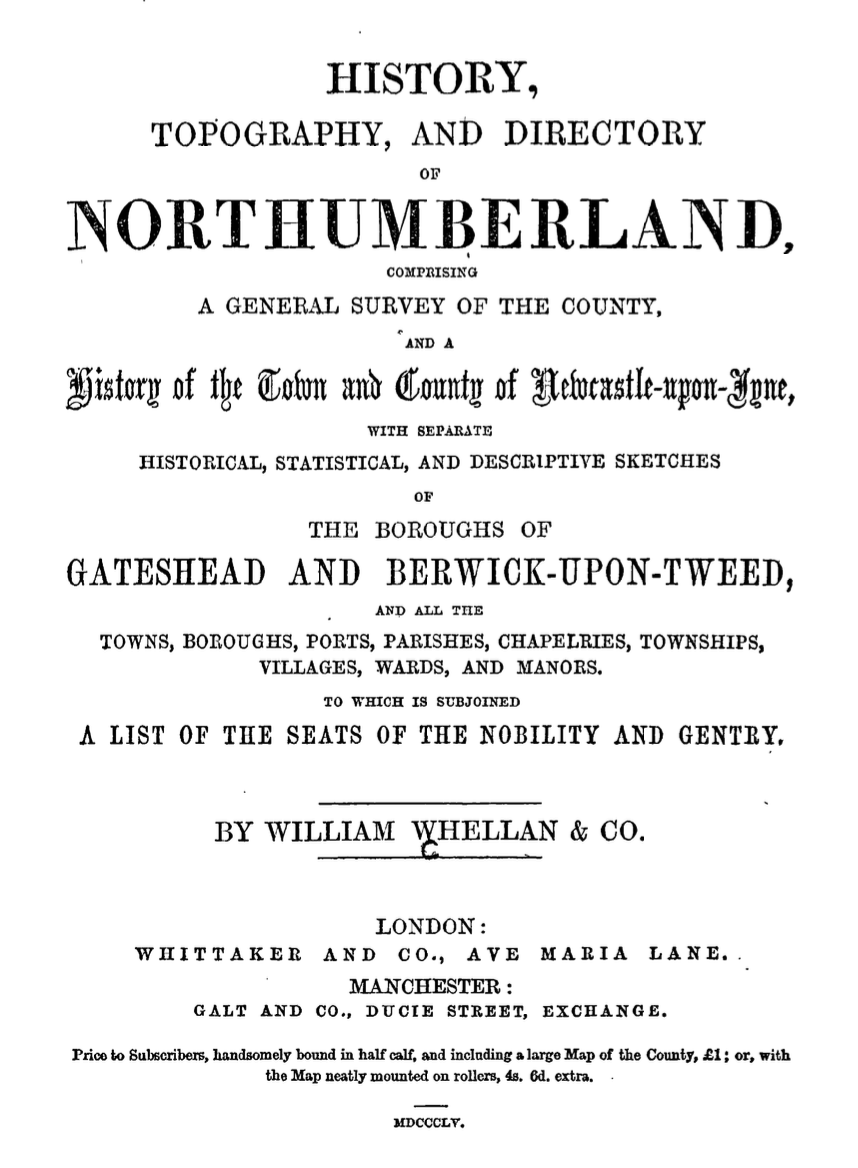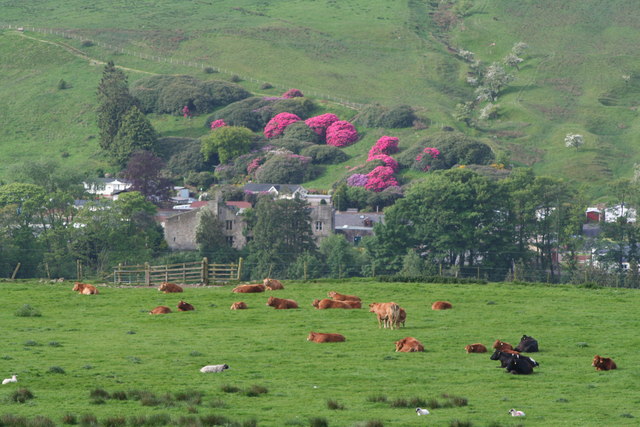Topics > Northumberland > Civil Parishes in Northumberland > Haltwhistle Civil Parish > Haltwhistle Parish, 1855
Haltwhistle Parish, 1855
Extract from: History, Topography, and Directory of Northumberland...Whellan, William, & Co, 1855.
HALTWHISTLE PARISH
HALTWHISTLE parish comprises the townships of Bellister, Blenkinsopp, Coanwood (East), Featherstone, Haltwhistle, Hartley Burn, Henshaw, Melkridge, Plainmellor, Ridley, Thirlwall, Thorngrafton, and Wall Town. It is bounded on the north by the wastes of North Tindale, on the west by Cumberland, on the south by the parishes of Kirkhaugh and Lamesley, and on the east by those of Wark, Simonburn, Warden, and Whitfield. It is about twelve miles in length, by the same in breadth, and contains an area of 55,229 acres. The population in 1801, was 2,930; in 1811, 3,335 ; in 1821, 3,583; in 1831, 4,119; in 1841, 4,655; and in 1851, 5,379 souls. The Newcastle and Carlisle Railway passes through the parish, and has stations at Haltwhistle, Bardon Mill, and Greenhead. Coal is abundant in this district, and is extensively worked at Hartley Burn, Midgeholme, Barcombe, Morewood, and Birkshaw ; there are also several stone quarries. The South Tyne intersects this extensive parish from Featherstone Castle to the mouth of the river Allen, and is crossed by a good bridge at Haltwhistle, and by another at Featherstone, about three miles above the town. The banks of the South Tyne, for an extent of ten miles, present some of the most beautiful and picturesque scenery in this part of England. Several pleasing views may also be obtained in the vale of the Tippal, which extends from the Glenwhelt to the Tyne, and the scenes on the Allen, though rather circumscribed, are peculiarly romantic, exhibiting beautiful curvatures formed by the serpentine course of the stream, which is bounded by rocks, and overhung with woods. A great portion of this district consists of extensive moors, which form a striking contrast with its rich haughs and cultivated lands.
THE TOWN OF HALTWHISTLE
HALTWHISTLE is a township and market-town in the parish of the same name, the property of John Clayton, Esq., Dixon Dixon, Esq., and Colonel Coulson. Robert Bower, Esq., and Miss Charlotte Heron are the possessors of the manorial rights and privileges. The township contains 2,759 acres, and its rateable value is £4,117. Population in 1801, 453; in 1811, 751; in 1821, 707; in 1831, 1,018; in 1841, 984; and in 1851, in consequence of the formation of a railway, and the enclosure of common land, it had attained to 1,420 souls.
THE TOWN of Haltwhistle is pleasantly situated on an eminence, on the north side of the South Tyne, fifteen miles west of Hexham, and 315 N.N.W. of London. It is but indifferently built, but there are here two turreted buildings, and at the east end of the town is an eminence called Castle Banks, which is of an oval form, and has a fine spring in the centre. At the east and west ends there are four distinct terraces raised one above the other ; the summit of the bill is defended by a breastwork of earth, and on the south by an inaccessible precipice rising abruptly from the river, and forming a kind of amphitheatre. The ancient Roman fort, Whitchester, is situated near the river, and is defended on three sides by steep and rugged glens. Haltwhistle is one of the polling places for the southern division of the county. Various trades are carried on here, but the only manufacture is a coarse kind of baize. A market was granted to this town by King John, in the year 1270. The market day is Tuesday, and fairs, chiefly for horned cattle, horses and sheep, linen, woollen, and Scotch cloth, are held on the 14th May, the 17th September, and the 22nd November. Hirings for servants take place on the 12th May and the 11th November.
This town was plundered by some Scottish outlaws in the year 1598, for which they were severely punished by the Lord Warden of the Middle Marches. The following is the Lord Warden's account of the affair. "The first thing they, (the outlaws) did, was the taking of Haltwesell, and carrying away of prisoners, and all their goods. I sent to seek justice for so great a wrong. The opposite officer sent me word it was not in his power, for that they were all fugitives, and not answerable to the King's laws. I acquainted the King of Scots with this answer. He signified to me that it was true, and that if I could take my own revenge without hurting his honest subjects, he would be glad of it. I took no long time to resolve what to do, but sent some two hundred horse to the place where the principal outlaws lived, and took and brought away all the goods they bad. The outlaws themselves were in strong- holds, and could no way be got hold of. But one of the chief of them being of more courage than the rest, got to horse, and came pricking after them, crying out and asking ' what be was that durst avow that mighty work,' one of the company came to him with a spear, and ran him through the body, leaving his spear broken in him, of which wound he died. The goods were divided to the poor men from whom they were taken before. This act so irritated the outlaws that they vowed cruel vengeance, and that before next winter was ended, they would leave the whole country waste. His name was Sim of Cat- hill (an Armstrong) that was killed, and it was a Ridley of Haltwesell that killed him. They presently took a resolution to be revenged of that town. Thither they came and set many houses of the town on fire, and took away all the goods, and as they were running up and down the streets with lights in their hands to set more houses on fire, there was one other of the Ridleys that was in a strong-house, that made a shot out at them, and it was his good bap to kill an Armstrong, one of the sons of the chiefest outlaw. The death of this young man wrought so deep an impression amongst them, as many vows were made, that before the end of next winter they would lay the border waste. This was done about the end of May, 1589."
THE CHURCH, dedicated to the Holy Cross, occupies a delightful situation on the south side of the town, where the churchyard forms a fine terrace, commanding a beautiful and varied prospect of the surrounding country. It is a very ancient edifice, and consists of nave, aisles, and chancel: the latter is neatly furnished with oaken pews. Several members of the ancient family of Blenkinsopp have been interred here. Within the chancel is a tomb, on which is sculptured a crosier of excellent workmanship, and highly ornamented, and also the staff and scrip of a pilgrim. Of the person whose remains lie beneath this tomb, nothing whatever is known, his name and fame are alike buried in oblivion. There is also a tomb belonging to one of the Ridley family. The living, a vicarage in the archdeaconry of Northumberland and deanery of Hexham, is rated at £12 3s. 1½d., gross income £727, net income £593. Patron, the Bishop of Durham; incumbent, the Rev. W. Ives, M.A. The Presbyterians, Primitive Methodists, and Wesleyans, have also chapels here.
HALTWHISTLE SCHOOL was founded by the will of Lady Capel, in 1719, and has an endowment of £37 10s. per annum, for which the children of the poor are taught at a limited charge.
Here is a MECHANICS' INSTITUTION which was established in 1848, ana now contains a library of 1,200 volumes, in the various departments of literature.
THE COUNTY COURT is held once a month. Judge, James Losh ; clerk, Henry Ingledew; assistant clerk, Robert Bell ; bailiff, William Wilson.
THE HALTWHISTLE POOR LAW UNION comprehends seventeen parishes and townships, including an area of 83,661 statute acres, and a population, in 1851, of 7,286 souls. The parishes and townships are Bellister, Blenkinsopp, Coanwood, Featherstone, Haltwhistle, Hartleyburn, Henshaw) Kirkhaugh, Knaresdale, Lambley, Melkridge, Plainmellor, Ridley, Thirlwall, Thorngrafton, Wall-Town, and Whitfield. THE UNION WORKHOUSE is a plain stone edifice, erected in 1840, and is capable of accommodating about sixty persons. The number of inmates at present (1854) is twenty-six. Edward Dowley, master; Ann Dowley, matron; Robert Elliott, surgeon; Robert Pickering, clerk ; and George Pickering, relieving officer.
CHARITIES. Besides the school, this parish possesses the following charities. A rent charge of £2 per annum, bequeathed in 1710, by Nicholas Ridley, and a rent charge of £3 a year left by Mr. John Robson, in 1790. These charities are the property of the poor, and are distributed in accordance with the declared intentions of the donors.
HALTWHISTLE DIRECTORY
POST OFFICE, HALTWHISTLE.-John Lowes, postmaster. Letters arrive from London and Carlisle, at 11-14 a.m., and from Newcastle and Gateshead, at 12-10 noon. The mail is despatched at 2-55 p.m.
|
Miscellany Armstrong Mrs. Ann Baty Miss Elizabeth Bell Mr. Thomas Bell William Brown Margaret, milliner Carrick Robert, brewer Craig William, manager, Haltwhistle Brewery Craig William, watchmaker EXCISE OFFICE, Crown Inn, Henry Drew, officer Forster Mary, bonnet maker Hadfield George, varnish manufacturer Harrison Ralph, colliery overlooker Hodgson John, painter Ives Rev. William, Vicarage Jackson Henry, blacksmith Keen Joseph, nail manufacturer Lowes John, saddler Maddison R. R. manager of coal, &c. works |
Madgen William, woollen manufacturer, Green Croft, works at Bardon Mill MECHANICS' INSTITUTION.- William Norman, librarian Murray John, draper Nanney Mrs. Barbara Middleton, Hall Meadows Nelson & Co. brick, &c. manufacturers Purkes Robert, superintendent constable Pattinson John, woollen manufacturer Pickering William, corn miller Reay Robert, dealer in millinery Saint Joseph & Son, woollen manufacturers and dyers Smith Mr. Robert, Rose-villa Smith J. S. T. W. chemist and druggist SOUTH TYNE COLLIERY COMPANY, coal owners, lime burners, &c. Steel Matthew, tin-plate worker Stephenson Rev. James Stokoe Mrs. Hannah Welton John, rakemaker Whitfield Joseph, station master Winter Mrs. Catherine, Hall Meadows |
|
Academies and Schools CHARITY ScrrooL, vacant Wells Ebenezer
Booksellers & Stationers Clementson John, & dealer in paper hangings Norman William, and printer and bookbinder
Boot and Shoemakers Baty Robert Birket Michael Crowe William Oliver and Snowdon Ridley John
Butchers Liddle Robert Wilkinson George
Cartwrights and joiners Liddle Robert Martin John Smith Joseph Wilkinson Thomas Wood John
Cloggers Henderson Joseph Pratt Joseph Scott William
Coopers Pearson George Robson Robert Walker John
Farmers Marked * are Yeomen. Blenkinsop John Blenkinsopp Robert, Portobello * Dryden Hugh Dryden Thomas, Comb Hill Elliott William, Cross-bank Lowes George, Calf Fields Makepeace Robert, Town-foot Farm * Pratt William, Comb Hill * Saint James Scott John, Wood Head Tweddelllsaac, Spital Telford Hannah, Fell House * White William, Lees Hall Wilkinson Thomas |
Grocers & Dealers in Sundries Armstrong Ann Bell Ann and Mary Bell Peter Bell Robert, and druggist Blenkinsop John, and ironmonger Carr Mark Dryden Hugh Forster Nicholas W. & nurseryman Johnston Eleanor Kirk George Maughan Thomas, New Bridge End Oliver & Snowdon, & drapers, ironmongers, & provision merchants Robson John Saint James, & ironmonger and draper Smith John Storey William Teasdale John Walton Isabella & Mary
Inns & Taverns Black Bull, Ann Gordon Blue Bell, William Irving Crown, Sarah Saul Grey Bull, Robert Pattison Manor House, James Smith Old Bay Horse, W. Wanless Sun, Thomas Kirkley Spotted Cow, Mark Wilton
Beer house Armstrong John, Commons
Stonemasons Armstrong Thomas, Milestone House Brown Joseph Graham John Rowell Joseph Saint James Watson John
Surgeons Elliott Robert Garner John H. Smith William Taylor Robert
Tailors Oliver Robert Ridley Edward Tallantyre T. B.
Temperance Hotels Lovatt William, Railway Ord Jane Saint James, & commercial, New Hall |
CARRIER, William Armstrong to Carlisle on Mondays, to Hexham and Newcastle on Wednesdays.
BELLISTER, a township comprising 988 acres, is situated one mile south west by south of Haltwhistle, and its rateable value is £902. The number of inhabitants in 1801, was 88; in 1811, 90; in 1821, 118; in 1831, 120; in 1841, 116; and in 1851, 131 souls. Cuthbert Ellison, Esq. is the principal landowner and lord of the manor. BELLISTER CASTLE, is a rude structure of irregular form, occupying an artificial mount, and was formerly- defended by a moat. The whole structure is now a mass of ruins without ornament or beauty, possessing none of that grandeur or sublimity so often associated with the remains of fallen greatness. The castle was the seat of a younger branch of the Blenkinsopp family, by whom it was possessed in the reigns of Edward VI. and Elizabeth.
PARK is a village in this township, two miles north-east of Haltwhistle, and. contains a Wesleyan Methodist Chapel, which was erected in 1830, at a cost of about £100.
|
Martin William, joiner, Park Snowdon Elizabeth, shopkeeper, Park Snowdon Hannah, schoolmistress, Park Snowdon Jacob, joiner, Park |
Farmers Pickering John, Wydon Snowdon Thomas, yeoman, Park Waugh Isaac, Linshield Waugh John, Broomhouses |
CARRIER to Newcastle.- Mattthew Ridley, on Wednesdays.
BLENKINSOPP, a township two and a half miles west of Haltwhistle, comprises an area of 4,919 acres, and its rateable value is £3,758 6s. 7d. Population in 1801, 196; in 1811, 252; in 1821, 317; in 1831, 344; in 1841, 845 ; and in 1851, 796 souls. Colonel Coulson of Blenkinsopp Hall is principal proprietor and lord of the manor. Here are extensive coal and lime works, carried on by the Blenkinsopp Coal and Lime Company. BLENKINSOPP CASTLE is a strong square tower built upon vaults, on an eminence south of the Tippal, and has been defended by a deep dry ditch on the north and west, on the south by a rivulet, and on the east by a steep bank. This fortress was the seat of the ancient family of Blenkinsopp. who were notorious for the part they took in the border feuds. We find it possessed by Ralph de Blenkinsopp in the reign of Edward I., by Thomas de Blenkinsopp in the reign of Edward III., and in the reign of Elizabeth, it was held by William Blenkinsopp, under the honour of Langley, paying annually for all services six shillings and eightpence, one half at Martinmas, and the other at Whitsuntide. It was subsequently transferred by marriage to the Coulsons, with whom it has since continued. A school was established here in 1839, by the Blenkinsopp Coal and Lime Company, for the education of the children of their workmen.
ANGERTON is a hamlet in this township, three miles west by north of Haltwhistle.
GREENHEAD, a village in this township, is situated about three and a half miles west by north of Haltwhistle, and possesses a neat Chapel of Ease, erected in 1827, from designs by Mr. Dobson of Newcastle, upon ground given by Colonel Coulson. The total cost of erection was upwards of £800. It is fifty-four feet by twenty-five, with a small tower, and is lighted by lancet-shaped windows, those on the east being decorated with the arms of the see of Durham, the Earl of Carlisle, and Colonel Coulson, besides other devices.
GLENWHELT forms the eastern suburb to this village, with which it is connected by a. bridge across the Tippal rivulet. The Roman station Carvoran is in the vicinity, and will be found fully described at page 33.
RED-PATH, and WYDON are both hamlets in this township, situated respectively two miles west by south, and one mile west south-west of Haltwhistle.
|
BLENKINSOPP COAL AND LIME COMPANY, John Whaley, agent; ho. Blenkinsopp Castle Bell Isaac, grocer Borrow William, grocer Coulson Colonel John B., Blenkinsopp Hall Graham William and John, blacksmiths, Greenhead Grieve Thomas, merchant, Glenwhelt Hewitson Joseph, shopkeeper Johnson John, innkeeper, Red Lion Inn Lennox John, schoolmaster Lennox Priscilla, schoolmistress, Greenhead Mason Robert, stationmaster Milburn John, shopkeeper Nelson George, innkeeper, Coulson Arms Renwick William, tailor |
Rowell Jeremiah, grocer Scott Robert, cartwright Whaley John, agent, Blenkinsopp Castle
Farmers Marked * are yeomen Armstrong Margery, Branchend Calvert John, and innkeeper, Globe Inn, Glenwhelt Carrick John, Carvoran * Errington Edward, Low Glenwhelt * Makepeace John, and overseer, Wry Tree Pattinson Edward, Waterloo Rutherford Thomas, Lampert Welsh William, Wydonclough |
COANWOOD, a township comprising 2,042 acres, the property of several resident farmers, is three miles south of Haltwhistle, and its rateable value is £952 10s. The number of inhabitants in 1801, was 151 ; in 1811, 175; in 1821, 165; in 1831, 156; in 1841, 139; and in 1851, 152 souls. GORBET HILL is a hamlet in this township, situated three and a half miles south of Haltwhistle. Here is a Meeting House of the Society of Friends, erected in 1760. RAMSHAW, HIGH and LOW are also two hamlets in Coanwood township three and a half miles south of Haltwhistle. WOLF HILL is another hamlet three miles south by east of Haltwhistle.
|
Wigham Jacob, miller, Low Hill
Farmers Marked * are yeomen Bell John, West Stone House * Birkett William, Garcock Charlton John, Burn House * Clemitson John, Wolf Hill Dickinson John, East Stone House * Edgar John, Green Syke |
Hetberington Thomas, Low Byer Hutchinson Matthew, and builder, Mill Hill Maughan Roger, Dykes Oliver William, Garbutt Hill Pattinson John, Garbutt Hill * Robson William, Burnt Wails Wallace Thomas Wigham Robert, Hargill House * Wigham Thomas, Low Mill * Wigham William, Coldshield |
FEATHERSTONE township is situated three miles south-west of Haltwhistle, and comprises an area of 2,844 acres, the rateable value of which is £1,967 10s. The population in 1801, was 197; in 1811, 219; in 1821, 239; in in 1831, 274; in 1841, 265; and in 1851, 314 souls. The Earl of Carlisle is lord oi the manor; and the principal landowners are the trustees of the Hon. J. Hope Wallace, who have also extensive saw mills here. FEATHERSTONE CASTLE is most picturesquely situated near the South Tyne, opposite the confluence of the Hartleyburn. It was formerly the seat of the ancient family of Featherstonehaugh, who were its possessors as early as the reign of Edward I., when it was the property of Thomas de Featherstonehaugh, and in the reign of Edward II., Alexander and Thomas de Featherstonehaugh, are recorded as its proprietors. Sir Albany Featherstonehaugh had opulent manors and possessions, and was High Sheriff of the county in the reign of Elizabeth. His eldest son Henry, who, at the beginning of the reign of James I., was appointed receiver-general of all the King's revenues in Cumberland and Westmoreland, had issue a son, Timothy, who, during the civil wars in the reign of Charles I., espoused the royal cause, and raised a troop of horse at his own expense. For his gallant conduct he was knighted under the King's banner, but was taken prisoner at the battle of Worcester, in 1651, after which he was beheaded at Bolton, in Lancashire, and the manor of Featherstonehaugh was sold by the parliament to the Earl of Carlisle; but the castle and estate came afterwards into the possession of Matthew Featherstonehaugh, Esq., of Newcastle, from whom it has descended to the present proprietors.
HORSE CLOSE is a hamlet in this township, four miles south-west of Haltwhistle. KELLAH is another hamlet in this township, four miles south-west by west of Haltwhistle. ROWFOOT is also a hamlet in Featherstone township, three miles south-west of the same place.
|
Carrick George, shopkeeper, Hillis Close Clark John, agent to the trustees of the late Hon. James Hope Walhee, Featherstone Castle Dobson William, vict. Pitman's Arms, Kellah Dickinson Eml'rson, gamekeeper, Hall Bank Head Hutchinson Robert, beerhouse, Rowfoot Hutchinson William, builder, Kellah Little George, shopkeeper and butcher, Highburn Foot Nixon John, manager of Saw Mills Parker Elizabeth, shopkeeper, Kellah Smith Rev. P. G. Stranger W. stationmaster Waugh John, beerhouse, Kellah Wright George, blacksmith |
Farmers Marked * are yeomem Birket Miles, Watch Trees Coulson Matthcw, Blacklocks, Burnfoot Dobson Richard and William, Kellah * Hudspelh Cuthbert, Horse Close Hutchison Matthew, Rowfoot * Hutchinson William, Rowfoot * Lee Joseph, Rowfoot Little George, Low Burnfoot Parker Thomas and Joseph, Kellah * Proud Edward, Rowfoot Teasdale Ann, Kellah * Snowdon William, Kellah Tweddle George and Thomas Tweddle James Watson Thomas, Highburn Foot |
HARTLEYBURN, a township four miles south-west of Haltwhistle, comprises 2,671; acres, the property of Messrs. Whitfield, and its rateable value is £789 12s. 6d. The number of inhabitants in 1801, was 74; in 1811, 77; in 1821, 92; in 1831, 161; in 1841, 288; and in 1851, 460 souls. Cuthbert Ellison, Esq., is lord of the manor. Here is an extensive tile manufactory, carried on by John Edgar & Co. Hartleyburn colliery, in this township, and Midgeholme Colliery, near the confines of Northumberland and Cumberland, are worked by Mrs. Maria Thompson, and afford employment to about 400 persons.
|
Bell Joseph, farmer, Halton Lea Bell Wallace, vict. Morpeth Arms Inn, Halton Lea Gate Dobson John, farmer, Clover Hill Dobson Thomas, coal agent, Halton Lea Gate Edgar John and Co., tile manufacturers, Hartleyburn Tile Works Henderson Henry, manager of tila works, Halton Lea Gate |
Modlin Jonathan, grocer and provision merchant, Halton Lea Gate Thompson Mrs. Maria, coalowner, Hartleyburn and Midgeholme Collieries, Thomas Dobson and WallaceBell, managers Todd Thos. farmer, Green Ridges Walton Jacob, farmer, Green Ridges Whitfield John, yeoman, Byers Hall Whitfield Thomas, yeoman, Foulpots |
HENSHAW is a township and hamlet, the property of Sir Edward Blackett, John Clayton, Esq., Sir Thomas Clavering, Nicholas Lowes, Esq., of Allen's Green, Mr. Richard Thompson, and others. The township comprises an area of 11,255 acres, and its rateable value is £4,316 12s. 6d. The number of inhabitants in 1801, was 568; in 1811, 509; in 1821, 593 ; in 1831, 619; in 1841, 569; and in 1851, 615 souls. Sir Edward Blackett is the possessor of the manorial rights and privileges. THE HAMLET of Henshaw is situated four miles south-west of Haltwhistle, and possesses two Chapels belonging respectively to the Wesleyan and Primitive Methodists. The former was erected in 1840, and the latter in 1836.
BARDON MILL, a hamlet in this township, four miles and three-quarters east of Haltwhistle, derives its name from a flannel manufactory, which is carried on by William Madgen and Son. Here is a station on the Newcastle and Carlisle Railway.
GREENLEY is another hamlet in this township, five miles north-east of Halt· whistle. In this neighbourhood there are four extensive loughs, or lakes, viz., Broomley Lough, Little Cow's Lough, Crag Lough, and Grindon Lough, all of which, except the last, are in the township of Henshaw. On the north side of Greenley Lough are several stupendous crags, from which some of the finest blocks of stone in the county are obtained. BONNEY RIGG HALL, in this township, serves as a temporary residence for Sir Edward Blackett, during the shooting season. TOWHOUSE, a hamlet in this township, is four miles east of Haltwhistle.
POST OFFICE, BARDON MILL STATION. John Harrison, postmaster. Letters arrive, from Newcastle and the South, at 11-55 a.m., and from Carlisle and the West, at 11-28 a.m.; they are despatched to Carlisle, &c., at 3-10 p.m., and to Newcastle and the South at 3-26 p.m.
|
Askew William, wood-bailiff, Kingswood Cottage Bell Robert, stonemason, Bank Head Graham Mr. Thomas, Tow House Harding John, blacksmith, Tow House Jackson Mr. John, Hardriding Harrison John, station master, Barrlon Mill HENSHAW SCHOOL, Robert Parker, teacher; ho. Prudhoe Castle Pattinson Ann, milliner and straw bonnet maker, Redburn Madgen William & Son, woollen manufacturers, Bardon Mill ; ho. Green Croft, Haltwhistle Ridley Andrew, gamekeeper, Bonney Rigg Robinson William, wood-bailiff, Joe House Robson George, blacksmith, Twice Brewed
Boot and Shoemakers Burkitt George, Bardon Mill Johnson John Knott Joseph, Redbnrn Smith Matthew, Henshaw
Cartwrights and. Joiners Cook William, Tow House Forster William, Tow House Henderson Thomas, Tow House Kirk Walter, Twice Brewed Makepeace John, Tow House Pattison Thomas, Redburn Shield George, Bardon Mill Thompson Francis, and cabinet maker, Tow House ; ho. Henshaw
Corn Millers and Merchants Reed Robert & Son, Plankey Mill Ridley James, Bardon Mill
Farmers Marked * are Yeomen Armstrong John, Hindley Steel Armstrong John, Braidley Hall Armstrong Margaret, Hardriding Armstrong Walter, Scotscoltherd Armstrong William, Bogg |
Farmers cont. Armstrong William, Bent's House Bell Anthony, Scotscoltherd Coats Isabella, Seatsides Cook John, Rufler's Close Cook Joseph, Redburn Cook William and John, Shawhead Dodd Barbara, Gibb's Hill Harding Thomas, Henshaw * Hedley Ralph, Waterhead Henderson William, Hunter Crook Johnson John, Kingswood Hall Laidlea John, Bank Head Liddell Christopher, Brockellee Lowes Thomas, Galleshaw Rigg Lowes William, Grindon Green Makepeace Nicholas, Ramshaw Field * Maughan John, Parkside Nixon John, Greenlee Pattinson Jonathan, Hardriding Pickering George, and registrar of births; deaths, and marriages, and relieving officer for Haltwhistle Union, Stone Hall Reed Robert & Son, Plankey Mill Ridley James, Bardon Mill Smith Cuthbert, Brown Rigg * Smith Edward, Cornholmes * Thompson Richard, Tow House * Thompson Thomas, Seatsides * Woodman Edward, High Shield
Grocers and Dealers in Sundries Bell Elizabeth, Low Winshields English Ann Forster William, Tow House Goodfellow Archibald, Redburn Hill Kirk Walter, Twice Brewed Robinson Margaret, Tow House
Inns and Taverns Blue Bell, John Ridley, Tow House Grey Hound, John Morrow, Bardon Mill __ Jane Bell, Twice Brewed __ Thomas Elliott, Twice Brewed |
CARRIER. Archibald Goodfellow, to Newcastle, on Thursdays.
MELKRIDGE is a township and hamlet comprising 4,451 acres, the property of Sir Edward Blackett, John Clayton, Esq., Thomas Clavering, Esq., and Robert Carrick, Esq., the former of whom is lord of the manor, and holds his court at Wood Hall, once in every three years. Population in 1801, 226; in 1811, 263, in 1821, 288; in 1831, 347; in 1841, 290; and in 1851, 264 souls. The rateable value is £3,141 5s. Near to the South Tyne, in this township, is the Roman military post, WHITCHESTER, which occupies a site defended on three sides by steep and rugged glens. HIGH TOWN is a hamlet in this township, one mile and three-quarters east of Haltwhistle.
|
Armstrong Mrs. Eleanor Armstrong William, vict. Three Horst Shoes Batey John, tea dealer Bell Mrs. Ann Carrick Robert, spirit merchant Carrick R. M. spirit merchant, Croft House Fairlamb Elizabeth, shopkeeper Hall Martin, schoolmaster, Cowburn Lowes Mr. Nicholas Mallabarr Captain G. High Town Nixon William, joiner Smith Miss Elizabeth, Whitchester
Farmers Marked * are Yeomen Armstrong George, Edge's Green Armstrong William, Edge's Green Bell Robert |
Dodd Walter Fairlamb Elizabeth Fairlamb Hugh Fidler William, Langhey Rigg Henderson Adam Hepple Thomas, Rell House Hudspith John, Cowburn Rigg Johnson Margaret, High Town Lee John, Melkridge Liddell John, Hallpeat Moss Liddell P. J. Soak Hill Liddell Robert, Melkridge Little William, Wealside Lowes John * Nixon William * Ridley Ann Robson Thomas Usher John Winter Thomas |
CARRIER.-William Armstrong, to Carlisle, on Monday, and to Newcastle, on Wednesdays.
PLAINMELLOR is a township and village, the property of Dixon Dixon, Esq, of Unthank Hall, who is also lord of the manor. The township comprises an area of 4,904 acres, and its rateable value is £1,655 18s, 4d. The number of inhabitants in 1801, was 136; in 1811, 174; in 1821, 184; in 1831, 160; in 1841, 150; and in 1851, 171 souls. THE VILLAGE of Plainmellor, which derives its name from a mountain in the neighbourhood, is situated on the south side of the Tyne, half a mile south-east of Haltwhistle. UNTHANK HALL, in this township, is a substantial stone edifice, the seat of Dixon Dixon, Esq.
|
Armstrong William, blacksmith Dixon Dixon, Esq. Unthank Hall
Farmers Bell William Cowing John |
Elliott John Forester William Little Robert Robson George Teasdale William Woodman John |
RIDLEY township is the property of Sir Edward Blackett, who is also lord of the manor, Mrs. Davison, and Nicholas Lowes, Esq. It contains 4,388 statute acres, and its rateable value is £2,657. Population in 1801, 191; in 1811, 205; in 1821, 231; in 1831, 233; in 1841, 258; and in 1851, 245 souls. RIDLEY HALL, which is situated on the south side of the Allen, at a short distance from Beltingham, derives its name from the Ridleys, of Willimoteswick, to whom it formerly belonged. It was afterwards the seat and lordship of the ancient family of Lowes, with whom it remained till 1812, when it became the property of Thomas Bates, Esq., but is now possessed by Mrs. Davison. The mansion occupies an eminence, five and a half miles east by south of Haltwhistle, in the midst of the most beautiful and picturesque scenery to be found in this part of the country.
ALLEN'S GREEN is a hamlet in this township, four miles east by south of Haltwhistle.
BELTINGHAM is another hamlet, situated five miles east by south of Haltwhistle. Here is a small chapel, which is claimed as the domestic chapel of the lord of the manor of Ridley. The living is in the gift of the vicar of Haltwhistle, and incumbency of the Rev. James Ord Clark. There is also a school and library, George Wright, teacher and librarian.
WILLIMOTESWICK is a hamlet and estate, in Ridley township, situated four miles east by south of Haltwhistle. Here are extensive ruins of the Castle, which was anciently the seat of the Ridley family, whose lineal descendants now reside at Blagdon. It is the property of Sir Edward Blackett, and is occupied by Mr. Joseph Reay Spraggon.
|
Clark Rev. James Ord Davison Mrs. Susan E. H. Ridley Hall Drummond Alexander, draper and grocer, Ridley Lowes Nicholas, Esq, Allen's Green Makepeace Mr. William, Penpeugh Wallace Thomas, joiner and cartwright, Ridley Woodman Matthew, blacksmith, Gold Hill Wright George, schoolmaster & librarian, Beltingham School ; ho. Ridley
Farmers Marked * are Yeomen Armstrong Robert, Hotbank Bushby Jacob |
Dickinson George, Wool House * Little James, Hot bank Makepeace John, Brierwood Maughan Nicholas, Midgeholme * Pearson John * Pearson Thomas Pearson William Ridley John * Ridley Matthew Hobson Edward, East Hotbank Robson Hannah, Penpeugh * Spraggon Joseph Reay, Willimoteswick Castle Usher George Wallace Thomas, Partridge Nest |
THIRLWALL township, which contains eighty scattered houses, and the hamlet of Foultown, extends from the Tippal Burn, four miles W.N.W. of Haltwhistle, to the river Irthing, which separates it from Cumberland. It comprises an area of 7,944 acres, and its rateable value is £3,069 7s. 9d. The population in 1801, was 322; in 1811, 282; in 1821, 293; in 1831, 328; in 1841, 394; and in 1851, 425 souls. The Earl of Carlisle is principal proprietor, and lord of the manor. THIRLWALL CASTLE, which has long been in ruins, stands on the west bank of the Tippal, at a short distance west of the point where that rivulet is crossed by the great Roman Wall. This fortress was for many generations the property of a family that bore the local name, but was subsequently transferred by marriage to Matthew Swinburne, Esq., of Capheaton, who sold the castle and manor to the Earl of Carlisle.
FOUL TOWN is a hamlet in this township, four miles W.N.W. of Haltwhistle.
|
Bell John, joiner Davison Thomas, innkeeper Douglas Mary, shopkeeper Graham James, beer house Harrison William, blacksmith Hetherington Thomas, tailor & shopkeeper Norman John, station master Smith Thomas, shopkeeper & butcher Snowdon John, joiner Wilson John, miller
Farmers Armstrong George Bell John Borrow Nicholas |
Blenkinsop George Bramwell Barbara Hudspith John Graham William and John, Long Byer, & Burnt Walls Nixon James Owen Thomas Patrich Margaret Peacock William Pearson Robert Robson William Smith John Smith Thomas Teasdale John Waugh George |
THORNGRAFTON is a township and small village, comprising 3,103 acres, the property of Sir Edward Blackett, Mrs. Davison, Miss Hedley, Edward Woodman, Esq., and a number of freeholders. The rateable value is £2,474 5s., and the manorial rights and privileges are possessed by the Duke of Northumberland, and Sir Edward Blackett. The number of inhabitants in 1801, was 239; in 1811, 238; in 1821, 247; in 1831, 263; in 1841, 272; and in 1851, 305 souls. There are three collieries in this township, viz. :- Barcombe Colliery, Morewood Colliery, and Birkshaw Colliery, the latter having been recently opened. There are also extensive sand and ironstone quarries. Within the manor of Thorngrafton and Ridley, is the Forest of Lowes, usually called Ridley and Hotbank Commons, until they were divided and enclosed by act of parliament, in 17 48. Housesteads, the Borcovicus of the Notitia, is situated in this township. For a full description of this station see page 31. THE VILLAGE of Thorngrafton is five and a half miles east by north of Haltwhistle.
MILL HOUSE, a hamlet in this township, is situated four and a half miles east of Haltwhistle
|
Bell Thomas, butcher Burn Ann, vict. Fox and Hounds Coulson Mr. Thomas Coats John, blacksmith Dickinson Nicholas, builder and coalowner, Birkshaw Colliery Makepeace John, coalowner,&c. (W. Makepeace & Co.); ho. West Wood Cottages Makepeace Francis, shopkeeper and shoe-maker Makepeace William & Co. coalowners, lime burners, and iron and sandstone quarry owners, Barcombe Colliery and Quarries Makepeare William, grocer, Mill House Nevin William, tailor Pratt Mr. Thomas, Mill House Robson and Coates, shopkeepers Sterling George, coalowner, Morewood Colliery; ho. Crindle Dykes THORNGRAFTON SCHOOL, Jas. Burn, teacher Thompson Thomas, miller |
Woodman Matthew, blacksmith, Gold Hill, Ridley, and Thorngrafton
Farmers Marked * are yeomen Atkinson William Baty James Bell John, Westend Town, Thorngrafton Dickinson Nicholas, Birkshaw Lee Robert, Mill House Mallabar Christopher Harrison, Westend Town, Thorngrafton Maughan William, High Meadows Reed J. and miller Reed William, High Braidley Usher William, Whitshields Woodman Edward, Thorngrafton * Woodman John, Thorngrafton * Woodman Nicholas, Crowhall |
WALL TOWN township comprises 2,956 acres, the property of G. H. Coulson, Esq., who is also lord of the manor. It is situated two and a half miles north-west of Haltwhistle, and its rateable value is £1,263. The population in 1801, was 89; in 1811, 120; in 1821, 109; in 1831, 96; in 1841, 85; and in 1851, 81 souls. This township is intersected by the Roman Wall, and contains the remains of the stations of Vindolana, and Aesica, which will be found described at pages 32 and 33.
|
Robson Thomas, gamekeeper
Farmers Armstrong Alexander Armstrong James Dixon Robert, Allolee |
Lowes Edward Sisson Thomas Smith John Snowball William Wilkinson John |

